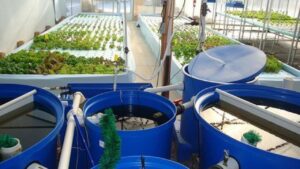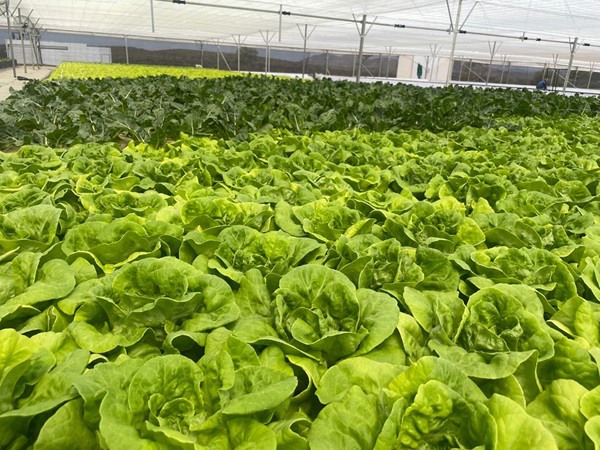The latest aquaculture farm in Namibia, Oribi Aquaponics Namibia Trust, supplies leafy greens to all the major distributors in Namibia. Situated in Okahandja, 70km north of Windhoek.

Ryno Postma, a chartered accountant and commercial director of Oribi Aquaponics Namibia Trust, reports the Namibian trust is proud of Oribi (for short) and their loyal Aquaponics assistants. The management and staff are most production conscious and were thoroughly trained in Aquaponics systems and plant care.
“As with hydroponics, Aquaponics uses only 10 percent of the water used in soil-based vegetable production, and subsequently the absolute answer to food production in the semi-arid central Namibia,” Ryno explains.
The start
Ryno and his cousin Heindré van Zyl started investigating the concept of Aquaponics back in 2017; it basically entails utilizing fish that excrete nutrients made available to plants and purifies the water in a recirculating system. The two cousins went to Kleinskuur Aquaponics outside Pretoria to visit the owner, Colin Bremner, a reputable Aquaponics farmer to update their technical knowledge on Aquaponics production principles.
One produce crops with no chemical fertilizers or pesticides, but, should you use chemical pesticides, the fish will succumb to the pesticides. In the Aquaponics system, the farmer is ensured to deliver good quality produce safe for human consumption.

Another aspect that sets Oribi apart from other production units in Namibia, is its high-care facility, where leaves are washed, dried, placed into pillow packs with modified atmosphere packaging (MAP), and kept cool. Also, in additional to the salad ranges grown, Ryno said they intend to produce baby cabbage as well in expansion to their herb selection.
As high temperatures prevail in the Okahandja area, three more modular and independent units will be constructed in 2024 (greenhouse structure with aluminium shade screens by Vegtech’s OptiGrow). The Phase 1A comprises three modular units in which a recent installed misting unit that shows already plants revive in the extra warm afternoon sun.
Aquaponics Improvements
Oribi is currently raising debt funding for the rest of the Aquaponics production system, which consist of a rainwater catchment system on the greenhouse roof which will enable the facility to become rainfed rather than boreholes dependent, also a plant seedling facility and a fish hatchery.
The Aquaponics system at Oribi uses Red 6 Mozambique tilapia from an Eastern Cape breeder, Rivendell Hatchery. They also plan to multiply fish in their own hatchery. Namibia is very strict on fish species allowed to be farmed with. Mozambique tilapia is an indigenous species, which is the breed that authorities would approve. Forward, trout will be introduced to market the fish protein to formal and semi-formal markets.
Trout requires an upper optimum water temperature range between 19 and 22°C, which is not ideal for Mozambique tilapia that excels in higher temperatures. The Red 6 strain is however more cold-resistant than its wild African derivatives. According to Ryno, the cool water temperatures, plus the new misting system, are key to producing plants throughout the hot Namibian days. Water is cooled by dropping two meters in vertical towers and reversible heat pumps should conversely, heat up the water in winter.

At Oribi, photovoltaic cells was planned to be constructed on the high care facility’s roof by a solar energy company that is a shareholder in the Oribi Aquaponics Namibia Trust. This is not to save power in batteries; their large number and diversity of pumps make it economically not viable.
Ryno mentions that their cost per kilowatt of solar power is expected to be almost double what is currently paid. Therefore Oribi remains on the Namibian national electricity grid.
Jan Conradie of Agricon Mushrooms in Okahandja shares administrative resources, cooled transport, and storage facility through a service level agreement with Oribi.
Foreign investments
Namibia government’s stability and commitment to agriculture attracts among the most foreign direct investment in Africa at the moment. Ryno says “Oribi is looking at further projects in Namibia and therefor active in other crops with the view on follow-up projects. Our country has a large drive to promote local production and hence, reduce food imports.” He emphasises Oribi Aquaponics Namibia Trust’s intention to improve food affordability in Namibia to have the end consumer and the general public benefit from increased access to food.
Furthermore, Oribi intends to bring crops to areas that have previously relied on imports and producing it at a fraction of the water cost of conventional cropping. “Aquaponics definitely have the edge over hydroponics systems when it comes to healthy food and less water usage,” Ryno concluded.

